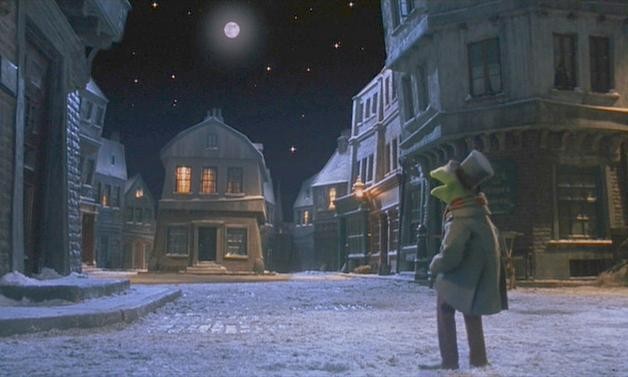In the classic film The Muppet Christmas Carol, when Bob Cratchit (in
a compelling portrayal by Kermit the Frog) is closing up Scrooge’s shop
on Christmas Eve, he suddenly begins to sing, as is his wont. He sings
about some things you might expect Kermit to sing about: magic in the
air, people loving and caring, the world smiling. After all, as the
refrain reminds us, “there’s only one more sleep ‘til Christmas.”
But I would like to bring attention to a line which is almost missed unless you’re paying close attention. Just before Mr. Cratchit comes upon the penguins’ Christmas skating party (excitedly crying out, “Oh! It’s the penguins’ Christmas skating party!”) he sings: “It’s a season when the saints can employ us / To spread the news about peace and to keep love alive.”
We may not often think of the saints when we think about Christmas, but maybe we should. After all, they’re celebrating Christmas too, and much more fittingly than we. How? Not by giving gifts to one another, but by praising God for his love, shown to us in the man Jesus Christ. And the saints employ us to do the same.
We hear a lot about peace around Christmastime. But peace is a big concept, the term is broad and vast. How can we fathom its real meaning? Luke’s Gospel offers some insight. After the angel proclaims to the shepherds the birth of the Savior,
And again, in the Psalms we read:
Salvation is experienced after this earthly life is done—but we can begin even now, like the hungry traveler who, while still afar off, smells the great feast being prepared for his arrival home. We do this by faith, by turning our hearts to the Lord who now dwells among us. The Word made man is the cause and culmination of the peace of Christmas, which we experience by faith in the Incarnation.
After the lengthy interlude in which Bob Cratchit and his murine friends admire the expert skating of the penguins, he continues singing. Today we can join him, looking forward to tomorrow’s celebration of the divine peace brought to us in the Incarnation: “Yes, faith is in our hearts today / We’re shining like the sun . . . After all, there’s only one more sleep ‘til Christmas.”
Image: Still from ‘The Muppet Christmas Carol’
But I would like to bring attention to a line which is almost missed unless you’re paying close attention. Just before Mr. Cratchit comes upon the penguins’ Christmas skating party (excitedly crying out, “Oh! It’s the penguins’ Christmas skating party!”) he sings: “It’s a season when the saints can employ us / To spread the news about peace and to keep love alive.”
We may not often think of the saints when we think about Christmas, but maybe we should. After all, they’re celebrating Christmas too, and much more fittingly than we. How? Not by giving gifts to one another, but by praising God for his love, shown to us in the man Jesus Christ. And the saints employ us to do the same.
We hear a lot about peace around Christmastime. But peace is a big concept, the term is broad and vast. How can we fathom its real meaning? Luke’s Gospel offers some insight. After the angel proclaims to the shepherds the birth of the Savior,
suddenly there was with the angel a multitude of the heavenly host praising God and saying: “Glory to God in the highest, and on earth peace among men with whom he is pleased!” (2:14)The angel alone proclaims Christ’s birth, but is joined by a great multitude in praising God for it. The saints, upon entrance into the heavenly kingdom, join this worshiping multitude, singing that eternal song of peace.
And again, in the Psalms we read:
I will hear what the LORD God speaks;The Lord speaks of peace for his faithful, and the heavenly multitude, angels and saints alike, speak of peace among men with whom he is pleased. This proclaimed peace is the kingdom of God which is at hand for us; it is salvation; it is Christ.
he speaks of peace for his people and his faithful,
and those who turn their hearts to him.
His salvation is near for those who fear him,
and his glory will dwell in our land.
(Ps 85:9-10)
Salvation is experienced after this earthly life is done—but we can begin even now, like the hungry traveler who, while still afar off, smells the great feast being prepared for his arrival home. We do this by faith, by turning our hearts to the Lord who now dwells among us. The Word made man is the cause and culmination of the peace of Christmas, which we experience by faith in the Incarnation.
After the lengthy interlude in which Bob Cratchit and his murine friends admire the expert skating of the penguins, he continues singing. Today we can join him, looking forward to tomorrow’s celebration of the divine peace brought to us in the Incarnation: “Yes, faith is in our hearts today / We’re shining like the sun . . . After all, there’s only one more sleep ‘til Christmas.”
✠














